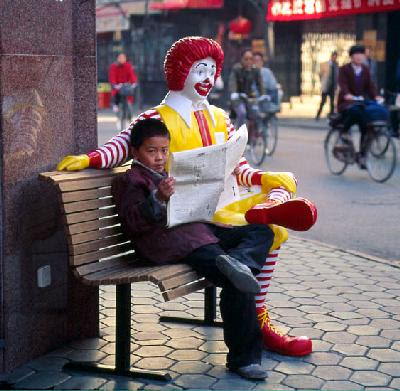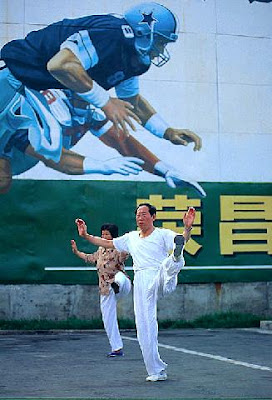
A decade ago, the idea that "Baywatch" would be available in China was unfathomable. Today, it is a reality. The siege of American culture on Chinese shores has increased exponentially over the past few years and will only continue with time. Although The Chinese government have great "face" to save and will never advocate or admit the americanization of its people, the masses have taken a different point of view. More and more Chinese people are growing fascinated with American culture. The speed of transformation is as utterly mystifying as it is amazing seeing that not long ago their society was a constrained, controlled one to say the very least.

Reading the article "The Americanization of China" was thoroughly enjoyable for me. I could not help but snigger at the fact that there were billboards of Nike's "Flyer Qiao Dan", otherwise known as Michael JORDAN, and that his "airness" outranked Mao in a survey. Although soccer has been the most popular sport in recent times, the popularity of basketball has been on the rise. Kids grow up now associating Ronald McDonald with Chinese culture while munching on Big Macs. People can be seen strutting around the streets parading the latest Levi's collection and some even bearing hip-hop outfits waltzing into clubs with names like "New York New York". Cinemas are no longer merely a run-down space playing Hollywood flops, rather the latest Tom Cruise and Sylveser Stallone flicks are now available in all its American glory. American products ranging from cosmetics to toothpastes have flooded the Chinese market and thanks partially to satellite technology, shows such as "The X-files" are now available too. At this rate, nobody would be surprised if there was a Mandarin version of Sesame Street in the making.

This Diffusion of culture through the media and other mediums is as clear as an example of cultural imperialism can get. It is clearly a "Give to dominate" strategy by the Americans as they would have many economic benefits to reap by bringing these franchises and products to China. In Shanghai, at one glance in certain areas, it is a sea of red. No, it is not the colours of communism, but the color of Coke. A French trader's cheeky remark does sum it all up really. "From some angles, it looks like Coke is sponsoring Shanghai." The Chinese government know that the influx of American culture is a "devious plot" to "conquer". However, they are quite powerless in stopping it because the masses are demanding it.
The Americans defend the invasion on China. They suggest that with the younger generation having the chance to experience American culture, it gives them a sense of attachment to the rest of the world, since the American brand is in fact at times the global one.
"It's maybe not for the older generation, but there is a feeling that if their child can eat at McDonald's then he can go out in the world and succeed." - Harvard Professor Watson .
Many people around the globe, and even here at home in Singapore, have adopted the popular American culture. Do you guys think that this is necessarily a bad thing? Or does it have its advantages?

 "They [UEFA] make a lot of comments about what they are going to do but they never back up the words with actions. Croatia was fined a few thousand quid. What is that going to do?"
"They [UEFA] make a lot of comments about what they are going to do but they never back up the words with actions. Croatia was fined a few thousand quid. What is that going to do?"


 Within the tribes, members demonstrate all the basic characteristics of being part of a group. There was casual interaction as everyone had begun as strangers to one another and needed to get to know their "team-mates". They're also interdependent for basic survival tasks i.e catching fish for food, collecting water, starting fires. Tribe members also have a certain degree of shared behavourial standards. For example, it is an unsaid rule that everyone must help in the day-to-day activities in camp. Lastly, each tribe has an obvious collective identity, albeit a rather superficial one, as they don their respective tribe's colours on their bandanas.
Within the tribes, members demonstrate all the basic characteristics of being part of a group. There was casual interaction as everyone had begun as strangers to one another and needed to get to know their "team-mates". They're also interdependent for basic survival tasks i.e catching fish for food, collecting water, starting fires. Tribe members also have a certain degree of shared behavourial standards. For example, it is an unsaid rule that everyone must help in the day-to-day activities in camp. Lastly, each tribe has an obvious collective identity, albeit a rather superficial one, as they don their respective tribe's colours on their bandanas.  Contestants have to constantly manage group dynamics and ensure that they balance their effort based on both individual and group needs. Should they choose to solely focus their energy on individual needs then they would be seen as selfish and voted off right away but at the same time they could not afford to just be the ultimate team player and not watch their backs because backstabbing was the name of the game. It is a classic case of group socialisation as contestants seeked to influence the group to act in certain ways or make certain decisions that would most benefit them in terms of their power and level of membership within the tribe.
Contestants have to constantly manage group dynamics and ensure that they balance their effort based on both individual and group needs. Should they choose to solely focus their energy on individual needs then they would be seen as selfish and voted off right away but at the same time they could not afford to just be the ultimate team player and not watch their backs because backstabbing was the name of the game. It is a classic case of group socialisation as contestants seeked to influence the group to act in certain ways or make certain decisions that would most benefit them in terms of their power and level of membership within the tribe.
